Abstract
BACKGROUND. A patient's satisfaction with a consultation may be influenced by many factors relating to both patient and doctor. AIM. This study set out to examine the effects of emotional disturbance and its detection on general practice patients' satisfaction with the consultation. METHOD. A prospective study involving 893 adult patients attending 12 general practitioners in Glasgow was carried out. Questionnaires were completed by general practitioners after consecutive surgery consultations. Patients completed forms assessing mental state and satisfaction with inter-personal aspects of the consultation. RESULTS. Patients reporting frank psychological disturbance tended to express more dissatisfaction with the inter-personal aspects of the consultation. This effect was alleviated in the majority by recognition of the disturbance by the general practitioner. General practitioners differed markedly in their assessment of the psychological component of consultations. Fewer dissatisfied patients were found in the surgeries of doctors who tended to rate the psychological component of consultations more highly. In contrast, the general practitioner's overall accuracy of diagnosis of psychological distress was a poor predictor of the proportion of dissatisfied patients. CONCLUSION. This preliminary study suggests that a tendency among doctors to assign importance to the psychological component of consultations may enhance elements of patient satisfaction. It is not clear whether this [psychological-mindedness' is an attribute which can be learnt. To resolve this uncertainty, studies are needed of the effects on patients of educational interventions designed to increase general practitioners' sensitivity to psychological distress.
Full text
PDF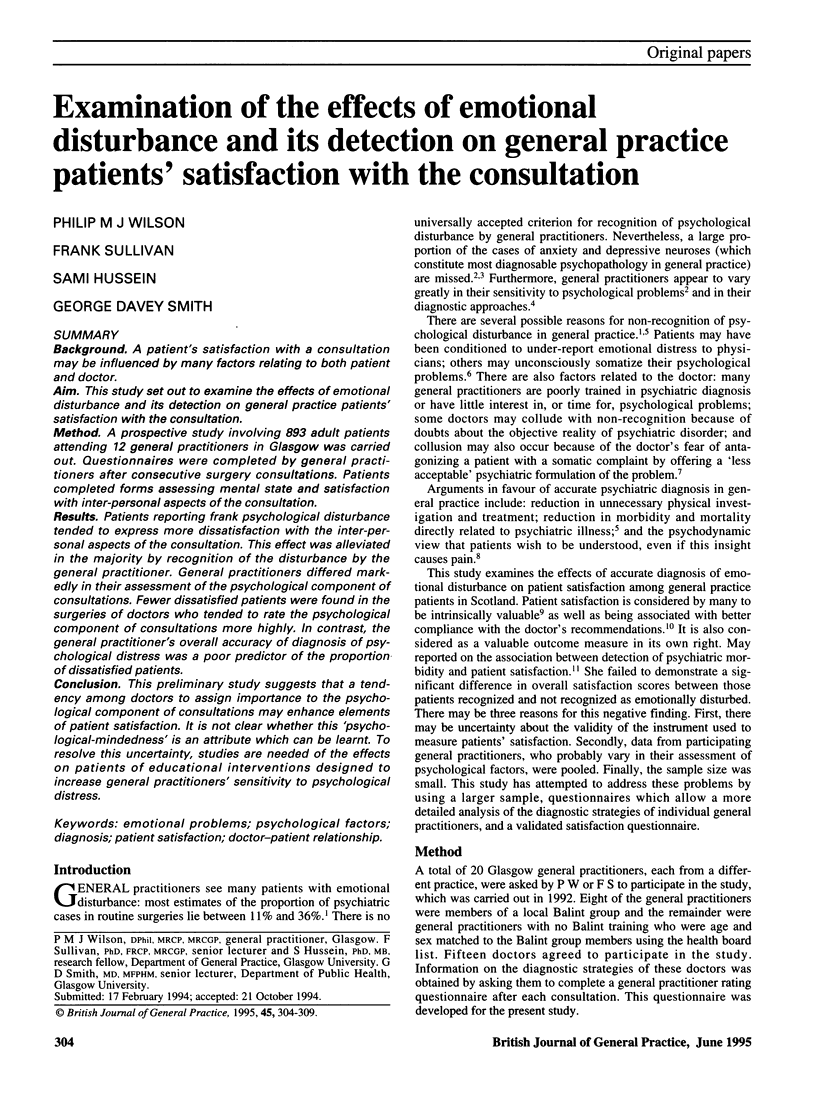
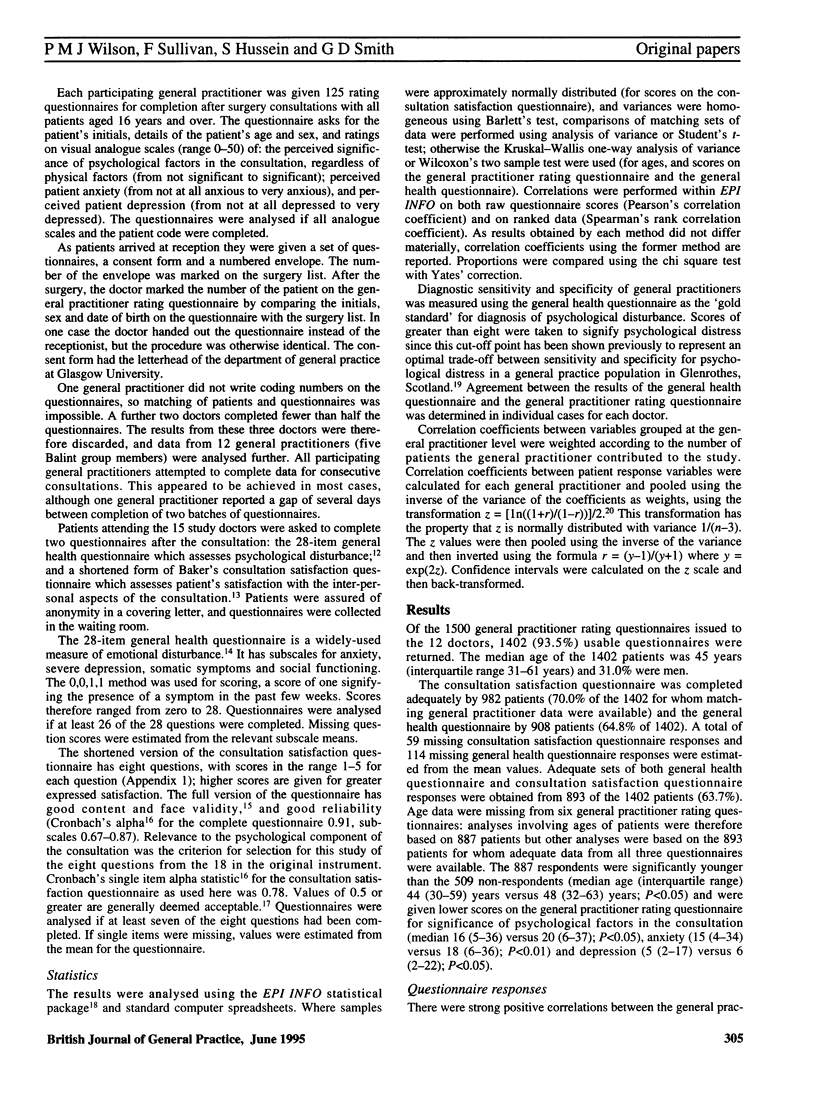
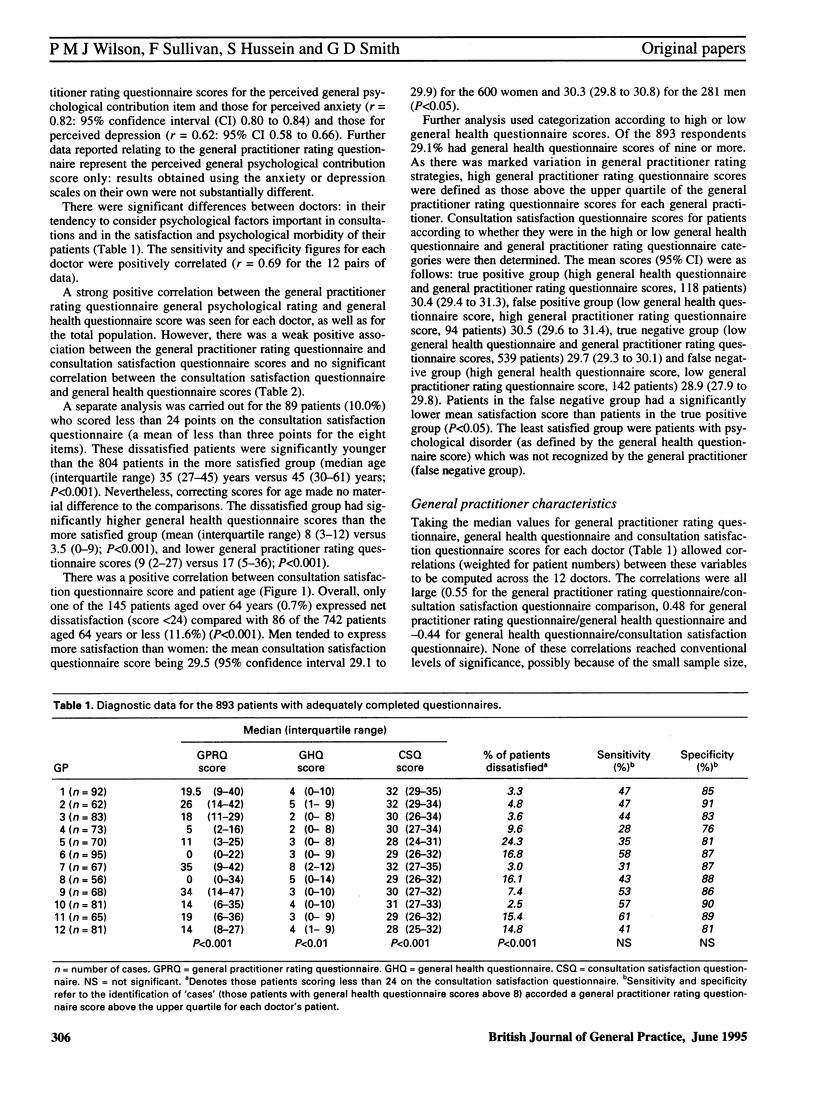
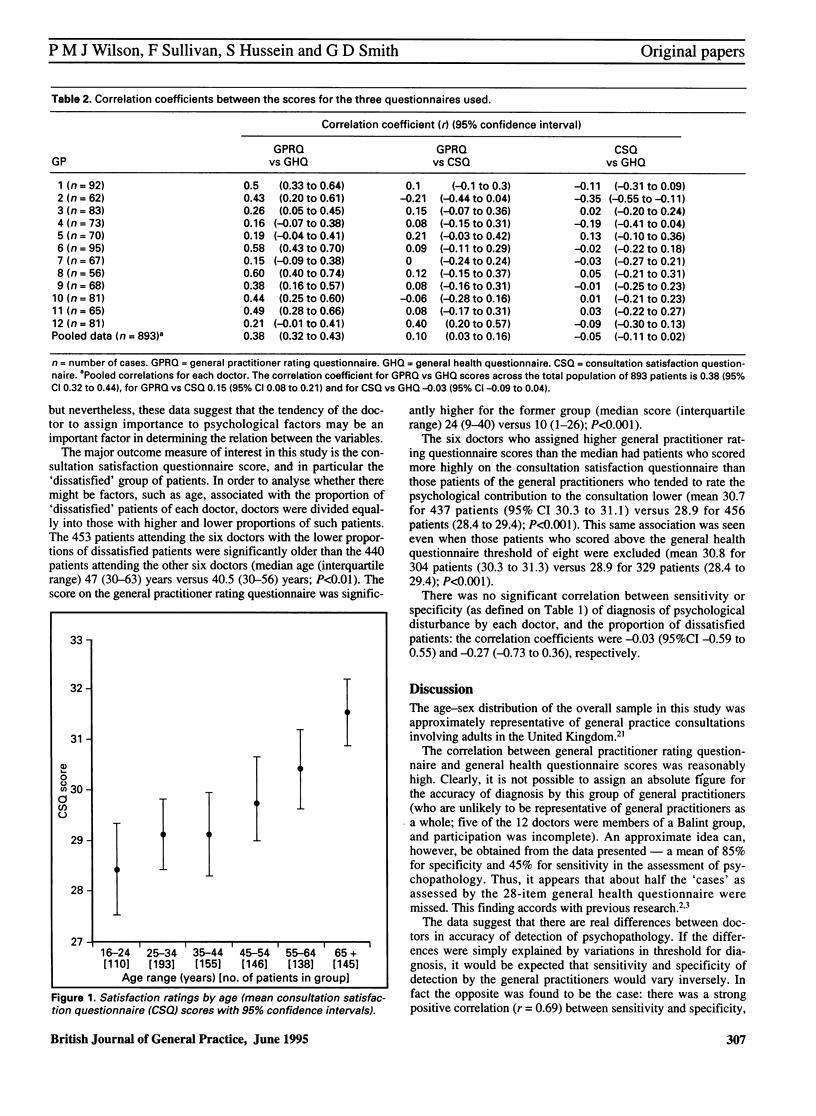
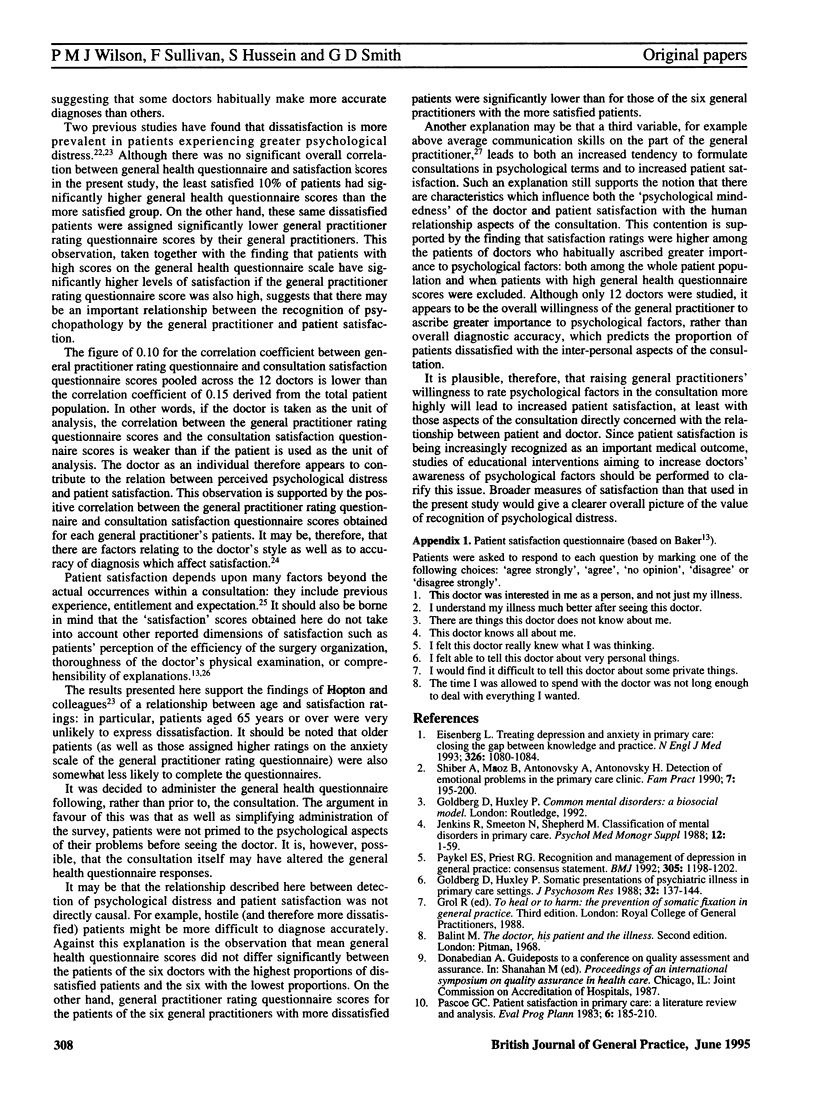
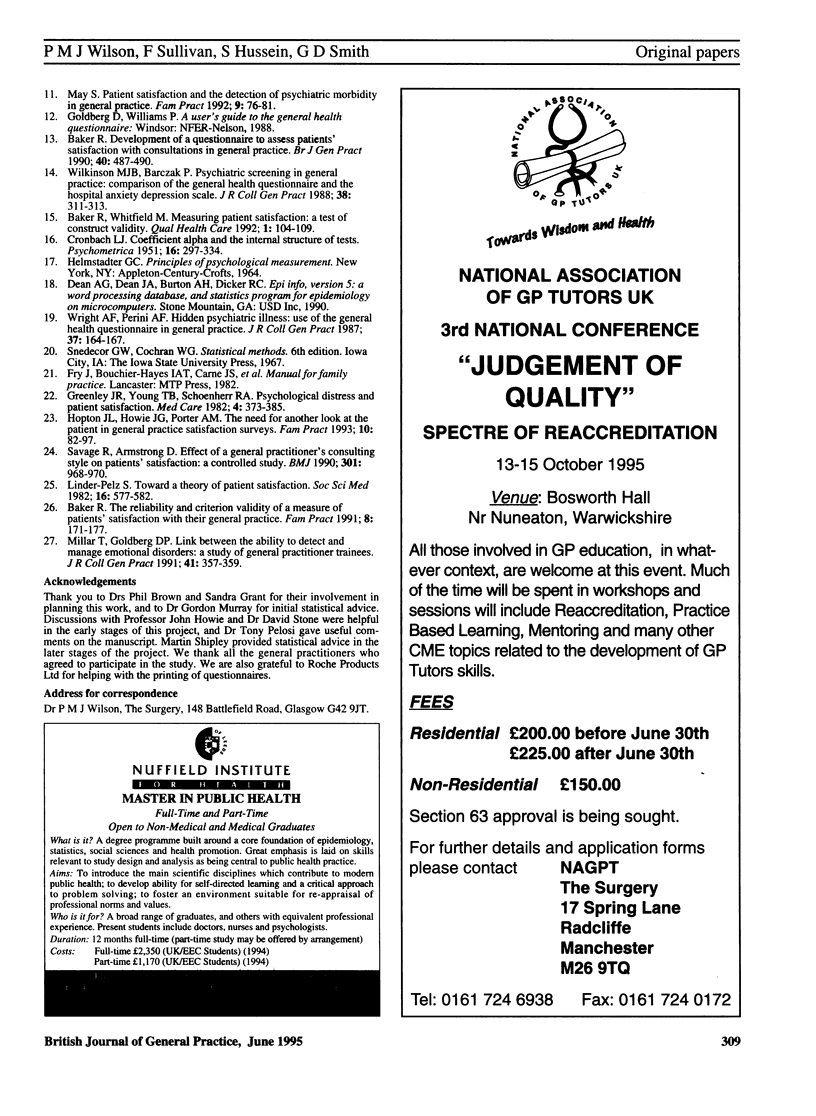
Selected References
These references are in PubMed. This may not be the complete list of references from this article.
- Baker R. Development of a questionnaire to assess patients' satisfaction with consultations in general practice. Br J Gen Pract. 1990 Dec;40(341):487–490. [PMC free article] [PubMed] [Google Scholar]
- Baker R. The reliability and criterion validity of a measure of patients' satisfaction with their general practice. Fam Pract. 1991 Jun;8(2):171–177. doi: 10.1093/fampra/8.2.171. [DOI] [PubMed] [Google Scholar]
- Baker R., Whitfield M. Measuring patient satisfaction: a test of construct validity. Qual Health Care. 1992 Jun;1(2):104–109. doi: 10.1136/qshc.1.2.104. [DOI] [PMC free article] [PubMed] [Google Scholar]
- Eisenberg L. Treating depression and anxiety in primary care. Closing the gap between knowledge and practice. N Engl J Med. 1992 Apr 16;326(16):1080–1084. doi: 10.1056/NEJM199204163261610. [DOI] [PubMed] [Google Scholar]
- Goldberg D. P., Bridges K. Somatic presentations of psychiatric illness in primary care setting. J Psychosom Res. 1988;32(2):137–144. doi: 10.1016/0022-3999(88)90048-7. [DOI] [PubMed] [Google Scholar]
- Greenley J. R., Young T. B., Schoenherr R. A. Psychological distress and patient satisfaction. Med Care. 1982 Apr;20(4):373–385. doi: 10.1097/00005650-198204000-00003. [DOI] [PubMed] [Google Scholar]
- Hopton J. L., Howie J. G., Porter A. M. The need for another look at the patient in general practice satisfaction surveys. Fam Pract. 1993 Mar;10(1):82–87. doi: 10.1093/fampra/10.1.82. [DOI] [PubMed] [Google Scholar]
- Jenkins R., Smeeton N., Shepherd M. Classification of mental disorder in primary care. Psychol Med Monogr Suppl. 1988;12:1–59. doi: 10.1017/s0264180100001995. [DOI] [PubMed] [Google Scholar]
- Linder-Pelz S. U. Toward a theory of patient satisfaction. Soc Sci Med. 1982;16(5):577–582. doi: 10.1016/0277-9536(82)90311-2. [DOI] [PubMed] [Google Scholar]
- May S. Patient satisfaction and the detection of psychiatric morbidity in general practice. Fam Pract. 1992 Mar;9(1):76–81. doi: 10.1093/fampra/9.1.76. [DOI] [PubMed] [Google Scholar]
- Millar T., Goldberg D. P. Link between the ability to detect and manage emotional disorders: a study of general practitioner trainees. Br J Gen Pract. 1991 Sep;41(350):357–359. [PMC free article] [PubMed] [Google Scholar]
- Pascoe G. C. Patient satisfaction in primary health care: a literature review and analysis. Eval Program Plann. 1983;6(3-4):185–210. doi: 10.1016/0149-7189(83)90002-2. [DOI] [PubMed] [Google Scholar]
- Paykel E. S., Priest R. G. Recognition and management of depression in general practice: consensus statement. BMJ. 1992 Nov 14;305(6863):1198–1202. doi: 10.1136/bmj.305.6863.1198. [DOI] [PMC free article] [PubMed] [Google Scholar]
- Savage R., Armstrong D. Effect of a general practitioner's consulting style on patients' satisfaction: a controlled study. BMJ. 1990 Oct 27;301(6758):968–970. doi: 10.1136/bmj.301.6758.968. [DOI] [PMC free article] [PubMed] [Google Scholar]
- Shiber A., Maoz B., Antonovsky A., Antonovsky H. Detection of emotional problems in the primary care clinic. Fam Pract. 1990 Sep;7(3):195–200. doi: 10.1093/fampra/7.3.195. [DOI] [PubMed] [Google Scholar]
- Wilkinson M. J., Barczak P. Psychiatric screening in general practice: comparison of the general health questionnaire and the hospital anxiety depression scale. J R Coll Gen Pract. 1988 Jul;38(312):311–313. [PMC free article] [PubMed] [Google Scholar]
- Wright A. F., Perini A. F. Hidden psychiatric illness: use of the general health questionnaire in general practice. J R Coll Gen Pract. 1987 Apr;37(297):164–167. [PMC free article] [PubMed] [Google Scholar]



